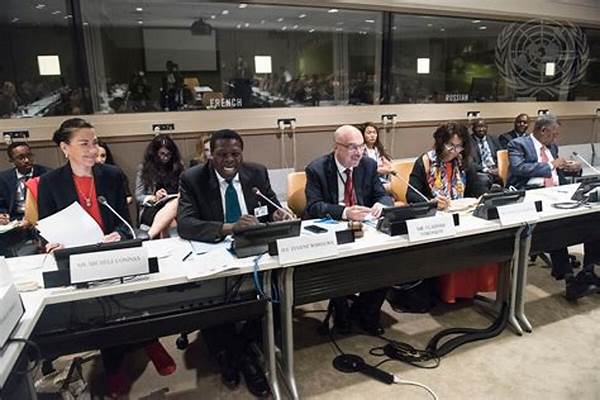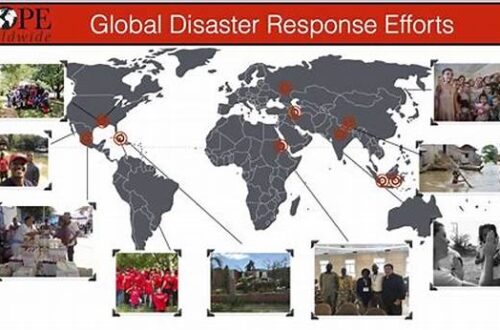In an increasingly interconnected world, the importance of maintaining peace and security across national borders has become paramount. Cross-border peace support initiatives have emerged as a crucial mechanism to ensure stability in regions susceptible to conflict. These initiatives involve collaboration between nations, international organizations, and local communities to address underlying issues that lead to tensions. Formalized efforts in this domain are necessary to foster sustainable peace and security.
Understanding Cross-Border Peace Support Initiatives
Cross-border peace support initiatives are collaborative efforts aimed at addressing conflicts that transcend national boundaries. Such initiatives are essential for maintaining regional stability and ensuring that disputes do not escalate into larger conflicts. Through formal agreements and cooperative frameworks, countries engage in dialogue, mutual support, and coordinated actions to mitigate tensions. These initiatives often encompass peacekeeping missions, conflict resolution strategies, and humanitarian aid. By engaging diverse stakeholders, cross-border peace support initiatives harness collective wisdom and resources to address complex challenges effectively.
Coordination among countries is vital in cross-border peace support initiatives to prevent conflicts from escalating. Such coordination involves formalized agreements to promote dialogue and cooperation across borders. These initiatives strive to create sustainable solutions through diplomatic engagement, fostering goodwill among nations while addressing the root causes of potential conflicts.
International organizations play a crucial role in cross-border peace support initiatives by providing a neutral platform for dialogue and negotiation. Through their efforts, conflicting parties can come together to resolve differences and work towards lasting peace. By facilitating communication and understanding, these organizations contribute significantly to the success of peace initiatives.
Local communities are often integral to the success of cross-border peace support initiatives. By involving communities in peacebuilding processes, initiatives can be tailored to address specific grievances and cultural aspects. This localized approach ensures that peace efforts are relevant and sustainable, fostering long-term harmony in impacted regions.
Cross-border peace support initiatives often involve humanitarian aid to address the immediate needs of affected populations. Through coordinated efforts, international actors can deliver aid effectively, alleviating suffering and fostering goodwill, which are essential for long-term peace. Humanitarian interventions thus complement formal diplomatic efforts.
The effectiveness of cross-border peace support initiatives can be enhanced through the use of technology and data-driven approaches. By leveraging modern tools, initiatives can identify potential flashpoints and allocate resources swiftly, ensuring timely interventions. Such technological integration into peace strategies exemplifies the innovative potential of contemporary peacebuilding efforts.
Challenges in Implementing Cross-Border Peace Support Initiatives
Cross-border peace support initiatives face numerous challenges that require careful consideration. One significant challenge is the complexity of involving multiple stakeholders, each with different priorities and interests. Coordinating these entities under a unified strategy often proves demanding, necessitating skilled diplomatic engagement and negotiation.
Another challenge lies in gaining and maintaining trust among countries with a history of conflict. Establishing confidence is crucial for the success of any collaborative effort. Therefore, initial peace support initiatives often focus on trust-building measures, such as facilitating communication, transparency, and shared objectives among parties.
Funding is a perennial issue that affects the sustainability of cross-border peace support initiatives. Securing financial resources from committed donors, including states and international organizations, is essential to sustain long-term efforts. Without consistent funding, initiatives risk being cut short, undermining the progress made towards peace.
Political changes within participating countries can also impact the effectiveness of cross-border initiatives. Shifts in government or policy may alter a country’s commitment to peace efforts, affecting collaborative progress. Monitoring such changes and adapting strategies accordingly becomes vital for the initiatives’ continuity.
Finally, cross-border peace support initiatives often encounter skepticism from local communities who may view them as externally imposed. To overcome such skepticism, initiatives engage in community outreach and involve local leaders in planning processes, ensuring that peace efforts align with local needs and priorities.
Key Components of Effective Cross-Border Peace Support Initiatives
Successful cross-border peace support initiatives are built on several key components. These include strong leadership, comprehensive frameworks, and adaptable approaches to changing environments. Leadership is necessary to navigate complex political landscapes and drive initiatives with clarity and purpose.
Comprehensive frameworks provide a structured approach to addressing conflicts holistically. This involves identifying root causes, assessing regional dynamics, and crafting targeted interventions. Such frameworks allow initiatives to be tailored to specific contexts, ensuring greater relevance and effectiveness in conflict resolution efforts.
Adaptability is essential for the sustainability of peace initiatives. As conflicts evolve, so must the strategies employed. An adaptable approach ensures that initiatives remain responsive to new developments and can incorporate innovative solutions when needed. This dynamic aspect is key to the long-term success of cross-border peace efforts.
Cross-border peace support initiatives also rely on robust monitoring and evaluation mechanisms to assess progress. By tracking outcomes, stakeholders can identify areas for improvement and make necessary adjustments. This continuous feedback loop is crucial in refining approaches and ensuring that initiatives meet their objectives.
The involvement of local actors remains a fundamental aspect of successful initiatives. By empowering communities and incorporating their perspectives, peace efforts become more genuine and meaningful. Local ownership of the peace process is vital in cultivating enduring solutions that resonate with those directly affected.
Strategies for Enhancing Cross-Border Peace Support Initiatives
Enhancing cross-border peace support initiatives necessitates strategic planning and execution. One such strategy is to strengthen international cooperation through multilateral engagements. By fostering alliances with a variety of actors, initiatives can gain diverse perspectives and resources, enhancing their capacity to address multifaceted challenges.
Empowering women and youth is a strategic priority for peace initiatives. These groups often play transformative roles in peace processes, contributing unique insights and fostering inclusive solutions. Incorporating their voices ensures a comprehensive understanding of conflicts and promotes community-based peacebuilding efforts.
Capacity building is another strategy that enhances the effectiveness of initiatives. By investing in training and development for peaceworkers, initiatives can ensure that personnel are equipped with the necessary skills and knowledge to implement peace strategies effectively. This focus on professional development fortifies the operational capacity of peace initiatives.
Utilizing technology is an emerging strategy in cross-border peace support initiatives. From data analytics to communication platforms, technology can streamline operations and enhance coordination across borders. This tech-driven approach offers innovative solutions to traditional challenges in peacekeeping.
Finally, fostering a culture of peace through education and advocacy is essential in sustaining initiatives over the long term. By promoting peace education and raising awareness on the importance of collaboration, societies can develop a supportive environment for peace initiatives, fostering resilience against future conflicts.
Conclusion
In conclusion, cross-border peace support initiatives represent a crucial aspect of international relations aimed at fostering lasting peace and security. Through collaboration, dialogue, and strategic interventions, these initiatives address complex challenges that transcend national borders. Despite facing numerous obstacles, the continuous evolution and adaptation of strategies ensure their relevance and effectiveness in maintaining regional stability.
The multifaceted nature of cross-border peace support initiatives underscores the need for comprehensive approaches that incorporate diverse perspectives, from international organizations to local communities. By building on foundational components such as leadership, adaptability, and community involvement, these initiatives can achieve sustainable outcomes. As the global landscape continues to evolve, the importance of such peace support initiatives remains undiminished, signifying their essential role in a peaceful future.





